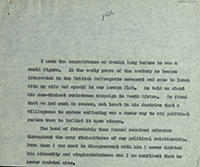Área de identidad
Código de referencia
Título
Fecha(s)
- c. 14 Sept. 1954 (Creación)
Nivel de descripción
Volumen y soporte
4 single sheets
Área de contexto
Nombre del productor
Institución archivística
Historia archivística
Origen del ingreso o transferencia
Área de contenido y estructura
Alcance y contenido
(Carbon copy. Date of recording, etc., taken from 5/120a.)
—————
Transcript
I made the acquaintance of Gandhi long before he was a world figure. In the early years of the century he became interested in the British Suffragette movement and came to lunch with my wife and myself in our London flat. He told us about his non-violent resistance campaign in South Africa. We found that we had much in common, not least in his doctrine that a willingness to endure suffering was a surer way to win political reform than to inflict it upon others.
The bond of friendship thus formed remained unbroken throughout the many vicissitudes of our political relationship. Even when I was most in disagreement with him I never doubted his sincerity and singlemindedness and I am confident that he never doubted mine.
I had many talks at different times with Gandhi—in India in 1926 when his resistance movement was at its height, in London in 1931 when we sat together on the Round Table Conference and during the many months when as Secretary of State I was in India with the British Cabinet Mission discussing daily with him and other leading Indian Statesmen the future governance of their land.
I have sometimes heard it said that Gandhi had an animosity against this country, and that particularly in the later part of his life he tried to do harm to Britain and her Empire. This is quite untrue. Gandhi had no such feelings or designs. Throughout his life he carried with him friendly memories of the time he spent in England as a young man and of the English friends he made then and on other visits.
What distressed Gandhi was imperialism as he saw it expressed in the attitude of the British Government towards India. He believed passionately that this was soul-destroying not only to his own countrymen but to the nobler instincts for freedom inherent in the British people. It was against this that he formulated his battle cry of “Quit India” which he was careful to explain did not mean expulsion from India of men and women of British race but the end of British rule. And it was because the word Dominion smacked to him of Domination that he rejected the offer of Dominion Status.
I never discussed with him the precise form of relationship between India and the British Commonwealth which would be most acceptable to him after India obtained her independent status and in fact he died before the matter came to be decided at a Conference of Commonwealth Prime Ministers. But I have no reason to think that he would have disagreed with the attitude taken up by Pandit Nehru which was accepted there.
I did not find Gandhiji a very easy person with whom to negotiate a political settlement. Where he considered a matter of principle was at stake he was very unwilling to make concessions. Even when in verbal discussion he appeared to have conceded a point I frequently discovered afterwards that his interpretation of our talk was not the same as mine. Some little word or phrase he had used which seemed unimportant at the time, I found later rendered the concession nugatory.
On the other hand Gandhi was often most generous in attributing good motives to those who differed from him. Another of his endearing qualities was his unbounded faith in the possibilities of ordinary men and women. There was no height of nobility or sacrifice which he would hesitate to demand from them. And it was wonderful how often they responded to his faith in them.
But this too had its dangerous side for he did not always seem to me to realise that Governments in the exercise of their responsibilities must sometimes use compulsory powers to restrain wrongdoers from doing harm to others.
Gandhi was known as a Mahatma on account of his ascetic life and his great spiritual faith which he drew from Hindu, Christian, Moslem and other religious sources. He was a great man too in the mundane sense because he won the allegiance of tens of millions of his fellow men and women and was rightly accounted one of the architects of Indian independence. I treasure his memory not only for these qualities but as that of a firm personal friend during the major part of a long life.
Valorización, destrucción y programación
Acumulaciones
Sistema de arreglo
Área de condiciones de acceso y uso
Condiciones de acceso
Condiciones
Idioma del material
Escritura del material
Notas sobre las lenguas y escrituras
Características físicas y requisitos técnicos
Instrumentos de descripción
Área de materiales relacionados
Existencia y localización de originales
Existencia y localización de copias
Unidades de descripción relacionadas
Área de notas
Identificador/es alternativo(os)
Puntos de acceso
Puntos de acceso por materia
Puntos de acceso por lugar
Puntos de acceso por autoridad
Tipo de puntos de acceso
Identificador de la descripción
Identificador de la institución
Reglas y/o convenciones usadas
Estado de elaboración
Nivel de detalle
Fechas de creación revisión eliminación
This description was created by A. C. Green in 2020.

